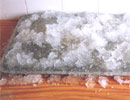Drought proof by biotechnology
With the super absorbent polymer from tapioca starch, the Institute of Chemistry (Vietnam Academy of Science and Technology) has successfully applied water-absorbing polymers to agriculture, helping plants retain water. drought areas, minimizing the crisis phenomenon due to lack of water in crops.
Super water-absorbing polymers were studied on the basis of modified cassava starch and oxidized starch with different contents (10 to 15%). With swellings 325 to 470 times in distilled water depending on the amount of starch, acts as a sponge, swelling and shrinking hydrate and hydration. Water is kept stable for plants because water-absorbing polymers cannot be separated by pressure to 5 bar.

A small pinch of powder can fill a tray of water.(Photo: ND)
This product has a special ability to absorb water, physiological saline, urine, blood and other solutions. Its durability for bacteria may vary, and depending on a number of factors, in a well-ventilated condition only a small breakdown occurs. Under anaerobic conditions, water-absorbing polymers can be decomposed by iron ions produced during the operation of sulfate-reducing bacteria.
So far, super absorbent polymer materials have been studied to apply in many fields such as making toilet paper, thickening agent, waterproofing agent, sweat absorbent . So when researching , scientists found that in addition to other areas, the applicability of agriculture to water-absorbing polymers is very high .
With features such as improved clay, sandy soil for planting; ensure water for transporting and moving crops; " sucking " rain water and irrigation water to increase the ability of moisturizing to change seasonal cultivation; keeping the amount of fertilizer that is not lost in the rainy season . this material opens a stable path for water supply to plants, minimizing the crisis caused by water shortage in plants.
Water-absorbing polymers contribute to the formation of a new research direction in Vietnam, contributing to accelerating the modernization of agriculture, which so far people have only used a traditional use. With 25 to 30 kg of super-absorbable polymer, it can improve and retain moisture for one hectare of agricultural land, doubling the productivity with little investment.
THANH VAN
- Human anti-drought weapons are here
- Many new studies at biotechnology conferences
- Cuba biotechnology has great development potential
- Cuba - China cooperates on biotechnology
- More than half of America has suffered from drought
- Ho Chi Minh City: Biotechnology has not met practical needs
- Some plants make drought worse
- Exchange of German-Vietnamese biotechnology experiences
- Binh Dinh 'asking for 100 billion dong to combat drought
- America: The most serious drought in nearly 60 years
- Unbelievable effects from drought
- Drought spreads causing serious damage in China
 Why do potatoes have eyes?
Why do potatoes have eyes? 'Tragedy' the world's largest carnivorous life: Death becomes ... public toilet
'Tragedy' the world's largest carnivorous life: Death becomes ... public toilet Tomatoes were once considered 'poisonous' for 200 years
Tomatoes were once considered 'poisonous' for 200 years Detecting microscopic parasites on human face
Detecting microscopic parasites on human face How do marine animals drink filtered water?
How do marine animals drink filtered water?  Discover the secret of the water buffalo
Discover the secret of the water buffalo  Shocking discovery about the Earth's 'tail'
Shocking discovery about the Earth's 'tail'  Top 10 Unbelievable Ways Animals Survive in Dangerous Environments
Top 10 Unbelievable Ways Animals Survive in Dangerous Environments  Mysterious wonders of the world
Mysterious wonders of the world  The largest animals that lived in the desert, still exist today
The largest animals that lived in the desert, still exist today 